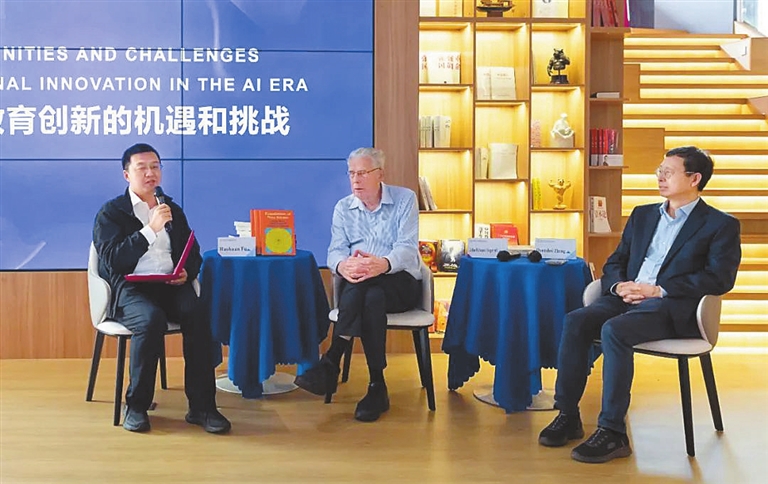
May Yeung JOHN EDWARD HOPCROFT, the 1986 Turing Award laureate from the United States, visited the Institute of Data and Information at the Tsinghua Shenzhen International Graduate School (Tsinghua SIGS) on April 23. There, he joined Zheng Quanshui — founding principal of the Shenzhen X-Institute and founding director of the Institute of Superlubricity Technology under the Research Institute of Tsinghua University in Shenzhen — to share wisdom and exchange views with Tsinghua SIGS faculty and students on the topics of “Opportunities and Challenges of Education Innovation in the AI Era” and “Interdisciplinary Research and All-round Development of Human Beings in the AI Era.” Hopcroft and Zheng offered their thoughts on topics including the application of AI tools, human-machine collaboration, the transformation of teachers’ roles, education equality, individualized growth of students, and reform of the evaluation system. Hopcroft pointed out that the ultimate goal of education in the AI era should be “stimulating students’ curiosity and exploring spirit,” which requires teachers to transform their role as knowledge transmitters into instructors and companions of students. He stressed that the effectiveness of education lies in the quality of classes and frequent interaction between teachers and students. Zheng called upon teachers in universities and colleges to stimulate students’ self-motivation. Zheng noted that educators should shift their mindsets, improve themselves, and learn about students’ motivations and passions in order to spark creativity. Zheng added that the future goal of education in the AI era is cultivating creative, cross-disciplinary talent capable of discovering real problems. During the Q&A session, students posed questions on multiple topics, including “How to identify personal interests in the AI era,” “How to correctly view the relationship between researchers and educators,” and “How AI technology can assist in cultivating a growth mindset.” Hopcroft addressed the students’ questions individually, drawing on his own experiences. He emphasized the importance of continuous learning and updating one’s thinking in the context of the rapid evolution of AI technology, and he encouraged students to focus on long-term value and proactively embrace future challenges. Hopcroft, an American theoretical computer scientist, was honored with the A. M. Turing Award in 1986. He has long been committed to improving the quality of global computer education and is one of the initiators of the “Pilot Work Plan for Undergraduate Education and Teaching Reform in the Field of Computers” (Program 101). Academician Zheng is an internationally renowned expert and educator in solid mechanics and micro/nano mechanics. He has overcome several long-standing mechanics problems that had puzzled the academic community, established the Tsinghua University Qian Xuesen Honors College and the Shenzhen X-Institute, and proposed the innovative concept of “breaking boundaries and creating.” | 
